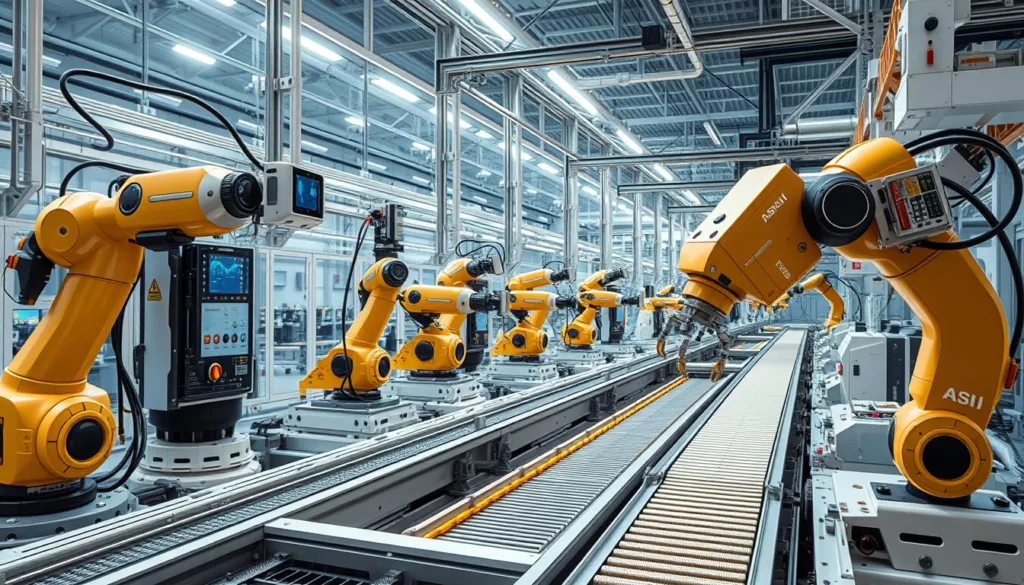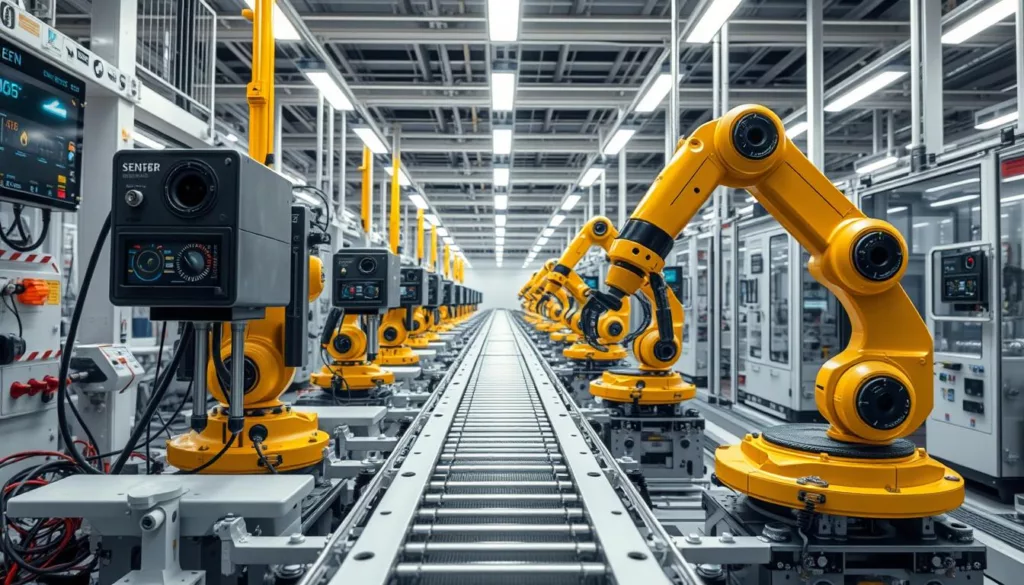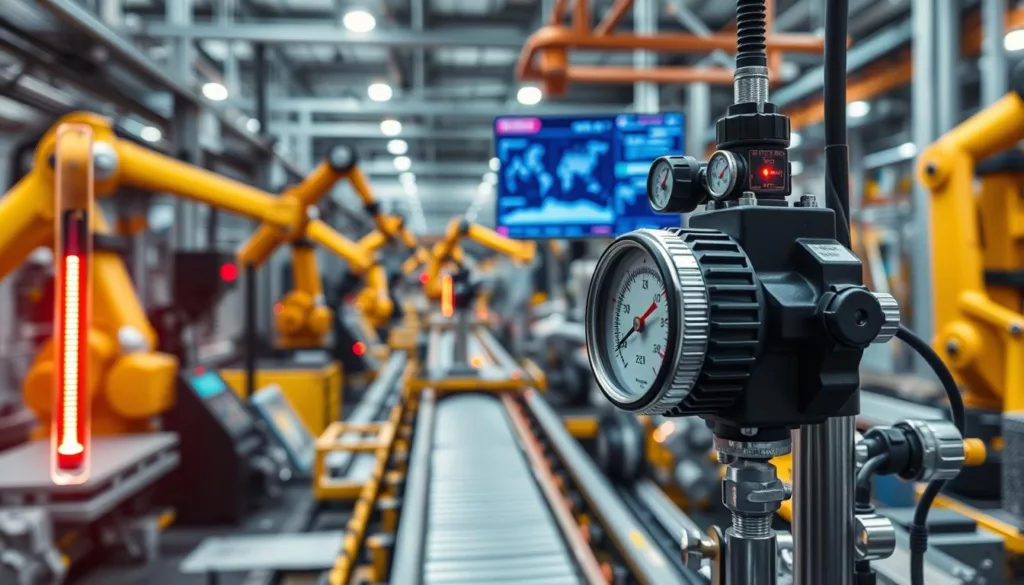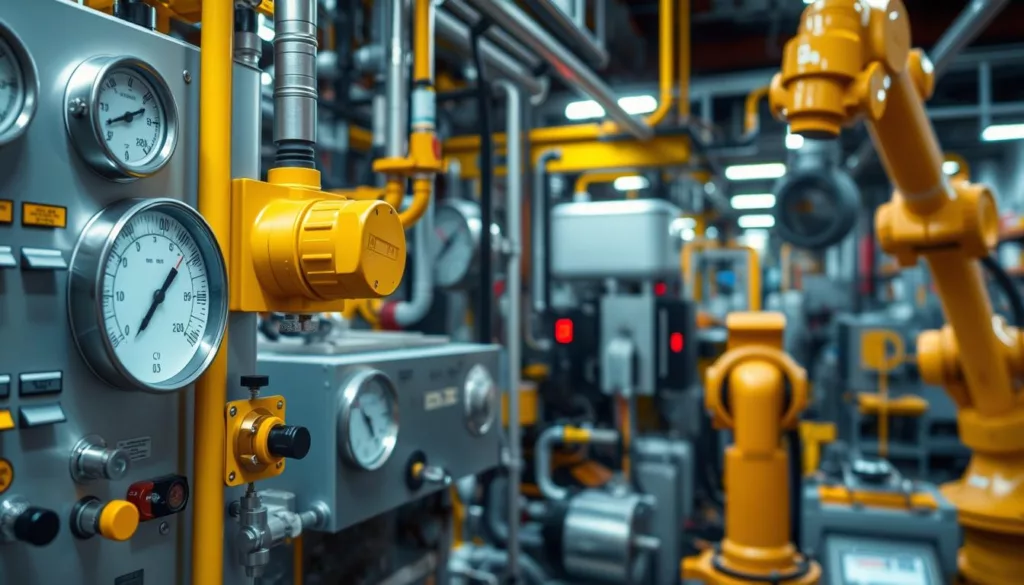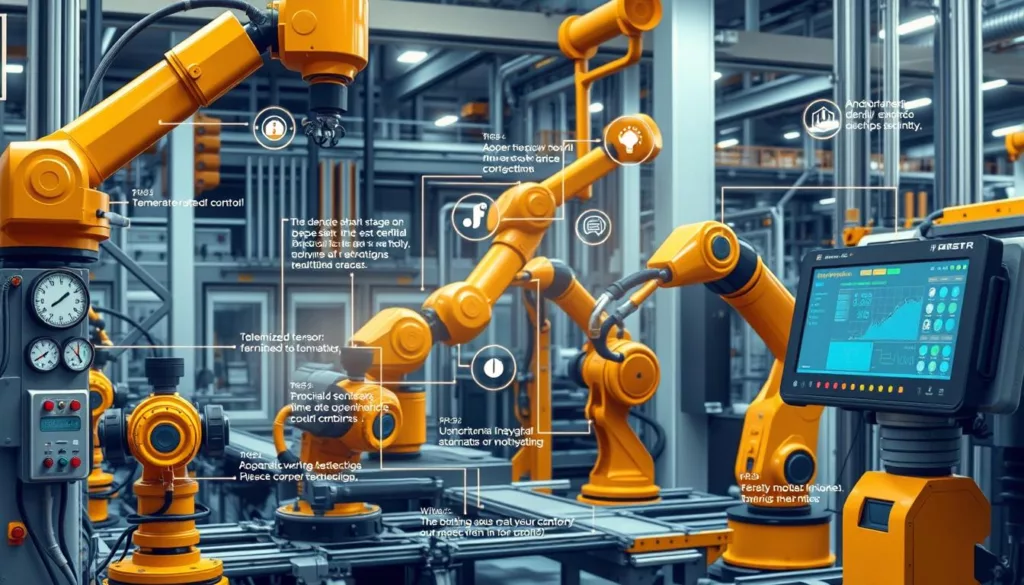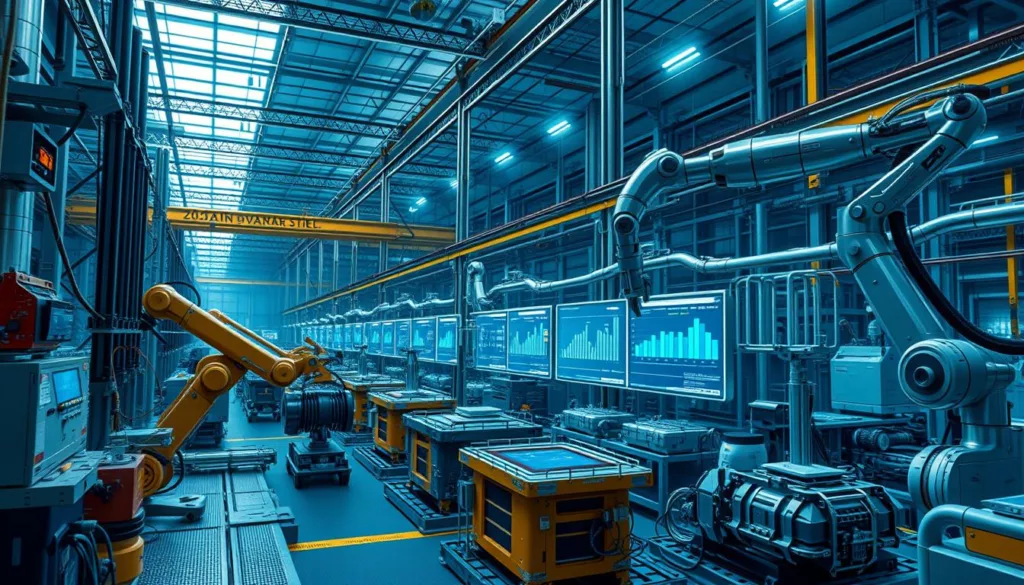In the world of industrial automation, sensors are key. They help modern factories work better and more efficiently. At XJCSENSOR, we know how important good sensors are for top performance in automation.
By using the latest sensor tech, companies can do more, work less, and make more. This means better results and less time waiting for things to get done.
Key Takeaways
- Sensors are vital for data collection and operational efficiency in industrial settings.
- They facilitate real-time monitoring and dynamic adaptability.
- Integration of advanced sensor technologies is essential for improved workflows.
- Sensors play a critical role in achieving optimal performance in automation systems.
- Effective sensor solutions help in reducing downtime and boosting productivity.
Introduction to Industrial Automation
Industrial automation is changing how we make things. It uses new technologies to make processes smoother, cut down on mistakes, and boost efficiency. This shift is big, showing how important sensors are in industry.
Sensors are key in this new world. They watch and listen, gathering data and sending it to control systems. Knowing about industrial automation means seeing how sensors help make factories more flexible and smart.
As more places turn to automation, it’s key to understand the basics. Knowing how sensors help improve work will help in making better choices and plans in the industrial world.
Understanding Sensor Technologies in Automation
In today’s fast-changing industrial world, knowing about sensor technologies is key. Different sensors help make systems work better and control them more precisely. They turn physical data into signals that machines can understand, making monitoring and action smooth.
Some important sensor technologies used in automation include:
- Temperature Sensors: These measure heat, which is vital for processes needing exact temperature control.
- Pressure Sensors: They track pressure changes, helping systems run at their best.
- Proximity Sensors: These detect objects without touching them, aiding in tasks on assembly lines and in manufacturing.
- Level Sensors: They check the amount of liquids or solids in containers, ensuring safe and efficient handling.
- Flow Sensors: Important for keeping track of fluid flow in pipes, they stop system failures from blockages or leaks.
Each sensor is vital for making automation systems more efficient and reliable. At XJCSENSOR, we have deep knowledge in these areas. We help our partners pick the right sensors for their needs.
| Sensor Type | Function | Applications |
|---|---|---|
| Temperature Sensor | Measures temperature variations | HVAC, Food Processing |
| Pressure Sensor | Monitors pressure levels | Hydraulic Systems, Pneumatics |
| Proximity Sensor | Detects presence of objects | Automated Assembly Lines |
| Level Sensor | Measures levels of substances | Water Treatment, Storage Tanks |
| Flow Sensor | Tracks fluid movement | Oil & Gas, Chemical Processing |
Role of Sensors in Industrial Automation and Control
Sensors are key in industrial automation and control. They help with many processes, making operations more efficient and productive. Knowing about the different sensors used shows how they help in various industries.
Types of Sensors Used in Automation
There are many types of sensors for automation, each for a specific need. Some examples are:
- Optical Sensors: Use light to find objects.
- Ultrasonic Sensors: Measure distances and find objects without touching them.
- Gyroscopic Sensors: Tell us about orientation and speed, important for controlling movement.
- Force Sensors: Measure forces accurately, ensuring precise and efficient work. Learn more here.
Each sensor has its own benefits, fitting different industrial needs. They give precise data, helping make better decisions.
How Sensors Facilitate Real-time Monitoring
Sensors let us watch industrial processes as they happen. This is key for keeping things running smoothly. They give instant feedback to those in charge.
By watching things closely, we can make quick changes in production. This keeps things running smoothly and prevents big problems.
Adding sensors to systems makes things better and opens doors for growth in many areas. Their role is huge in today’s industry.
The Importance of Sensors in Industry
Sensors play a key role in making industrial operations more efficient. They are used for safety checks, controlling processes, and ensuring quality. By collecting accurate data, sensors help industries make smart choices. This leads to big savings and boosts productivity.
Using sensors in industrial control offers many benefits. These include less waste, better use of resources, and improved production processes. High-quality sensors help companies keep their products up to standard, meeting customer expectations.
- Improved monitoring for quick assessments
- Enhanced safety with automated alerts
- More efficient operations
- More accurate measurements and control
In summary, using sensors in industrial processes boosts performance and reliability. For top-notch sensor solutions, check out XJCSENSOR. They offer high-quality sensor technologies for different industrial needs.
| Benefits | Description |
|---|---|
| Cost Savings | Reduced operational costs through efficient resource allocation. |
| Enhanced Safety | Automated systems that trigger alerts for hazardous situations. |
| Quality Assurance | Ensuring product consistency by monitoring key parameters in real-time. |
| Data-Driven Decisions | Real-time data allows companies to make informed operational choices. |
Industrial Sensor Applications
In today’s fast-paced world, sensors are key to making manufacturing better and products higher quality. By knowing how sensors work, companies can make their processes smoother and stay ahead of the competition.
Applications in Manufacturing Processes
Sensors are vital in many manufacturing tasks. They keep an eye on how well equipment works, making sure it runs at its best. Here are some ways they help:
- Temperature Control: Sensors check and adjust temperature in things like injection molding and making chemicals.
- Pressure Monitoring: In places like oil and gas, sensors watch for changes in pressure to avoid breakdowns.
- Position Verification: Sensors tell us exactly where robotic arms and conveyor belts are, ensuring they’re accurate.
- Flow Measurement: Sensors track how much liquid or gas is flowing, helping with fluid management.
Role in Quality Control and Assurance
Sensors are also super important for keeping quality high and defects low. They help by:
- Defect Detection: Automated systems with sensors spot bad products early on.
- Data Collection: Sensors collect important data that companies can use to improve quality.
- Process Verification: They make sure every step in making products meets quality standards.
Sensor Integration in Automation Systems
Adding sensors to automation systems makes them more efficient and reliable. Companies need to understand the role of sensors in industrial automation and control for top performance. Sensors connect machines, control systems, and people, making interactions smoother and decisions better.
Businesses should aim for effective sensor integration. A solid architecture with different sensors creates a strong automation system. This setup includes:
- Motion sensors for real-time tracking of machinery.
- Pressure sensors to monitor system conditions.
- Force sensors for feedback on robotic movements.
It’s important to know how each sensor helps the system and meets specific needs. Good practices in sensor integration in automation systems lead to better data and efficiency. For more on improving robotic control, check out this resource.
Benefits of Sensors in Industrial Control
Adding sensors to industrial control systems brings many benefits. It changes how things work for the better. The main advantages are:
- Enhanced Accuracy: Sensors give exact measurements, making sure systems work right.
- Improved Operational Efficiency: Watching things in real-time and collecting data cuts down on downtime and makes things run smoother.
- Reduced Maintenance Costs: Sensors help predict when things might break, saving money by avoiding unexpected repairs.
- Complex Process Monitoring: Sensors let us watch and analyze many things at once, helping us understand complex processes better.
At XJCSENSOR, we know a lot about sensors and how to use them. We create solutions that fit your needs. Using sensors helps your business grow and work better.
Advances in Sensor Technology for Industrial Applications
Recent advancements in sensor technology are changing the game for industries. These advances in sensor technology for industrial applications bring better efficiency and automation. Smart sensors with IoT connectivity help monitor and collect data in real-time, leading to smarter decisions.
New sensor solutions, like predictive maintenance sensors, help cut down on downtime. By using the role of IoT in sensor-driven automation, companies can make their operations more efficient. They can also act fast when system failures might happen.
- Increased data accuracy for better insights
- Enhanced connectivity through IoT frameworks
- Greater flexibility in sensor applications
- Reduction of operational costs via predictive analytics
By using these advanced sensor technologies, industrial experts can improve their strategies. They can quickly meet market demands. We help our partners understand and use these modern sensor capabilities effectively.
| Feature | Traditional Sensors | Smart Sensors |
|---|---|---|
| Data Collection | Manual input and local processing | Automated, real-time data streaming |
| Maintenance | Reactive maintenance strategies | Predictive maintenance via analytics |
| Scalability | Limited, often requiring physical upgrades | Highly scalable with cloud capabilities |
| Connectivity | Wired connections | Wireless, IoT-driven connectivity |
Conclusion
Sensors play a huge role in making industrial automation and control work better. They help make processes more efficient, ensure quality, and keep things safe. As we’ve seen, sensors are key to modern automation systems.
At XJCSENSOR, we offer custom sensor solutions for our clients. We aim to help businesses grow in a fast-changing world. We’re here to support you in improving your automation and control.
We’re all about innovation and expertise to help you optimize your industrial operations. Let’s work together to make your operations more efficient and effective. Sensors are at the heart of this journey.

